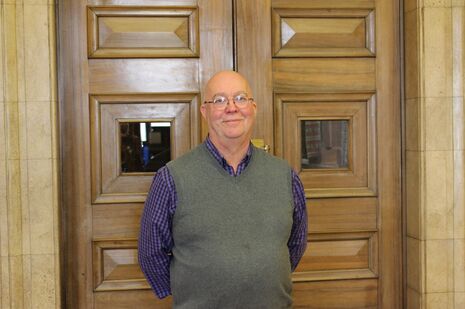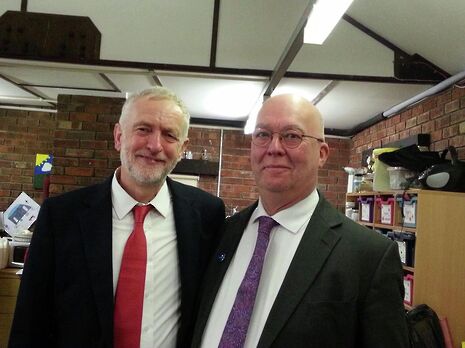Kevin Price: Life ‘should be about more than just existing’
Anna Fitzpatrick chats to one of the two candidates for the Labour Party nomination for the election of the first Mayor of a devolved Cambridgeshire and Peterborough authority

When I told people I was going to study at Cambridge, they were usually quick to comment on ‘how posh’ it would be. I was invited to imagine that everyone would wear tuxedos instead of pyjamas and eat gold leaf for breakfast.
When I recall this to Kevin Price – Cambridge City Council’s Executive Councillor for Housing and one of the two candidates vying for the right to represent the Labour Party in the upcoming mayoral contest for Cambridgeshire and Peterborough – he laughs. I persist in telling him, though, that I think Cambridge is ‘posh’. He laughs again and echoes me – “it is!”
But having grown up in Cambridge, worked at Clare College as a porter for ten years and devoted himself to representing local people, it is clear that Price understands that this is not the whole story. “The perception of Cambridge being very posh and very wealthy”, he tells me, “is, of course, a gross misconception.”
He is right. Although tweed-wearing boffins tend to be the public ‘face’ of Cambridge in art or the media, research shows that 90 per cent of the people who go to Jimmy’s Night Shelter are locals. “Parts of it are very wealthy,” he continues, “but I represent a ward [King’s Hedges] in the north of the city that is the [city’s] most deprived. And I hate using that term, because, you know, I’ve talked to people who say ‘I don’t like being that term…’” He explains to me that people feel like they are being categorised, undermining what he describes as the desire to feel that “although I’m not a multi-millionaire, I have my life, I live my life – I do all right.” It interests me that he feels as though people compare themselves to ‘multi-millionaires’. I ask him if he thinks there is a social division as stark as the ‘town versus gown’ phrase suggests.
“...there are more working class people coming to Cambridge University, so there is an understanding of what real life is like.”
This too, he highlights, is a misconception. “You know, not every student is from a very wealthy background and has a butler at home,” he points out, musing that “stereotypes work in a great many ways.” He recalls his time as a porter: “When I first got the job I thought – this is not gonna be for me – posh people coming in and looking down their noses at me. But it’s just not like that, it really isn’t. That’s a worry for a lot of students coming. It’s not just a lot of posh people in bow ties – it’s a lot of young people, having a good time, socialising and getting dressed up for it. There’s nothing wrong with that.” I ask him if this was the case in the past. “I don’t hear of many incidents of what they used to call ‘grad bashing’ in the sixties and seventies where students would be picked on…never say never, but that’s not as apparent to me as it was then. It’s partly because there are more working class people coming to Cambridge University, so there is an understanding of what real life is like. I think that helps.”
He further elaborates that many students can and do try to pierce the image of an academic ‘bubble’. “We have local councillors that were and are still graduate students. They’ve crossed that ‘divide’, if you like, and they’ve joined in with the city…that’s coming here and getting involved. When I got re-elected in 2011, I was astonished at the numbers of students who would come out on a Saturday or Sunday and come canvassing in the ward.”
“...it’s important that people don’t just have enough money to pay their rent – that’s what the living wage was all about. It should be about more than just existing.”
In his bid to be elected a mayoral candidate for a devolved Cambridgeshire and Peterborough authority, Price is continuing his fight for a seemingly unacknowledged poverty to be part of the discussion. He says that he wants to “put social justice at the heart of the devolution deal”. I ask him what this means. As well as “improving transport and local democracy” one of his key priorities is to ensure that people are not forced into homelessness through the provision of affordable housing, “by setting rent levels at what they call a ‘local housing allowance rate’, [meaning] anyone renting those homes, if they were on benefits, for instance, their benefits would cover the rent. If people are in employment it means that they still have money to actually live with, because it’s important that people don’t just have enough money to pay their rent – that’s what the living wage was all about. It should be about more than just existing.”

The recent words of Theresa May – that ‘if you’re young, you’ll find it harder than ever to own your own home’ – echo in my mind. I ask Price if he feels that her emphasis on home ownership is helpful. “No it’s not – it’s not helpful at all,” he confirms, “not everybody has that opportunity, certainly in a place like Cambridge, where 40% of the population earn £22,000 per year or less. The average price of a house is approaching half a million. It’s not doable.”
It makes sense, then, that he would recall that a major concern of people in his ward is that of council housing. “The private sector has never built enough housing. The only times when enough housing was being built was when local authorities and housing associations were building alongside developers”, he continues, highlighting the £70 million ring-fenced for building council housing in Cambridge city as part of the devolution deal. “Now, these are people that are already housed, well housed, but their concern is about the next generation, other people not having anywhere or a decent home,” he says of his ward.
With this in mind, I probe Price to look to the future, asking him what his prediction for the British political climate might be. He thinks for a while, before settling that “It’s not easy to predict.” Eventually, he reflects that “when people are hurting, when people feel that the government is doing everything it can to make life harder for them, you know – when they can’t get into their hospitals, they can’t get to see their doctors – the natural direction is the Labour Party.”
In the same speech, the Prime Minister stated that there are “no easy answers” to the question of how to ease the pain of social oppression. Price, though, tells me he believes that there are answers. “Well, there are easy answers,” he resolves. “One is in the realms of housing and how you make that genuinely affordable for people. One is about pay levels. People’s pay has stagnated over the past five or six years but everything else has seemed to increase in value. Corporate tax not being paid. The government will spend a lot of money investigating what they see as ‘benefit fraud’ and very little looking at tax evasion, when tax evasion takes far more money out of the economy than benefit fraud. That’s in no way saying that benefit fraud is okay, but they concentrate on the people at the bottom instead of making major companies, major organisations pay their fair share of tax.”
“I think the people of Cambridge are unique”
Finally, I ask Price what Cambridge means to him. “Well, first and foremost, Cambridge is home: it’s my hometown. I was born here, a lot longer ago than I’d like to admit,” he laughs, “and it’s important to me. I like the people of Cambridge, I think the people of Cambridge are unique because they have had to live alongside this perception of wealth and privilege.” In reference to that very perception, Price reminds me to broaden my focus to beyond the city of Cambridge to wider Cambridgeshire and Peterborough.
As a self-absorbed student, it’s easy to forget that this is an area which exists outside of the Union’s debating chamber. Chatting to Kevin reminded me of that.
 News / Cambridge academics stand out in King’s 2026 Honours List2 January 2026
News / Cambridge academics stand out in King’s 2026 Honours List2 January 2026 Interviews / You don’t need to peak at Cambridge, says Robin Harding31 December 2025
Interviews / You don’t need to peak at Cambridge, says Robin Harding31 December 2025 Comment / What happened to men at Cambridge?31 December 2025
Comment / What happened to men at Cambridge?31 December 2025 News / Varsity’s biggest stories of 202531 December 2025
News / Varsity’s biggest stories of 202531 December 2025 Features / “It’s a momentary expression of rage”: reforming democracy from Cambridge4 January 2026
Features / “It’s a momentary expression of rage”: reforming democracy from Cambridge4 January 2026









